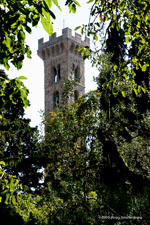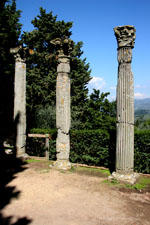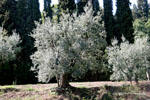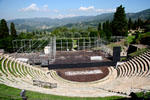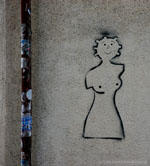9/25 Molloy Contemplates a Navel, but it is David’s, Not His Own
By dint of a reservation, Molloy was precipitated ahead of swarming lines of tourists (yech! Molloy, a resident for 12 weeks in Florence, looks down his Davidian nose at them) into the Galleria Accademia, where stands Michelangelo’s famous
David. Never mind that David’s clone dominates the Piazza della Signoria, along with the stern but handless Neptune, and another such clone rises on the Piazzale Michelangelo to look toward Brunelleschi’s dome.
David of the Galleria Accademia is the real
David, moved there for protection after a drunk in the 1800s tried to climb him and broke off a marble middle finger. Biblical David heroically took on many comers, not the least of which was a giant whom he slew and decapitated. Michelangelo’s
David, for all its power
, is, alas, defenseless, surrounded by a thick, waist-high plastic barrier. How could this stone image ever have attacked something much taller, even, than it?
David stands alone in the Accademia beneath a cupola in his naked glory, and Molloy was moved to contemplation not unlike David’s own. Why is this work great, and what makes other creative works so impressive that they are designated, like this one, “great”?
This deep question occupies many reams of aesthetic philosophy, so Molloy will, characteristically, trample complexities into simplicities and make a few comments that at least will satisfy him, so he can move on to treat other topics with similar dispassion.
Among the possible and interesting answers:
a. this
David is a breakthrough work and was recognized as such by its original audience. Several centuries of imitation and familiarity, however, have taken from our sensibilities the consciousness of how radically Michelangelo pushed the envelope.
b. Michelangelo’s
David re-thinks the Davidic tradition; we are used to seeing Hebrew characters represented in robes and head coverings; nakedness in the Bible is a sign of vulnerability and associated with uncleanness; Michelangelo’s David is a classically-proportioned (except for the hands) muscular fellow, naked and rippling as though he has been exercising in the gymnasium; he would have represented, to the Jewish viewers of Jesus’ time, that very alliance with Greco-Roman rulers that the tough-minded rebels hated. To a hypothetical Renaissance viewer, David, noble and contemplative, represents an ideal alien, even antithetical, to the Biblical tradition known through the Middle Ages. Why would any of Michelangelo’s audiences (Jewish or Catholic) have put up with him?
c. Interestingly, David is David early in life, not late, when the Biblical David had seen his first champion and mentor, Saul, turn against him, try to hunt him down and murder him; had his sordid and shameful affair with Bathsheba and subsequently lost a son; when Absalom, another son, rebelled against him and tried to steal the throne; when Absalom had murdered a half-brother over the rape of a sister. Michelangelo’s David gives no hint of the problems to come—only an imminent triumph. David thus stands as a warning to all that one triumph is not predictive of endless and unqualified success. (The films of Woody Allen, in Molloy’s humble opinion, are a modern instance of the principle.) The later David is burdened by family disasters, grayed and tormented.
But probably this is a more modern reading, since Michelangelo’s Catholic sponsors would more likely have seen David as the forerunner of that messianic line that led to Jesus, and in that sense the beginning of eternal triumph. (What a terrifying possibility: according to Christian tradition and the imaginary lineages of the gospels, no David, no Jesus; no Jesus, no salvation. No salvation, no
Divine Comedy, no
Paradise Lost, no Olivier Messaien, no Joyce, no Beckett. Gosh--no Beckett, no Molloy. No blogs. Is there rejoicing in Heaven over directions not taken? This is intriguing--God's omniscience enables Him not only to know everything that
will happen, but all the many possibilities of things that might have happened given any of the choices that might have been made.)
d. Michelangelo’s
David is so huge, that he is to the viewer, paradoxically, what Goliath was to him: a giant. Michelangelo gets to have it both ways: David is the ideal of humble contemplation, but also stands for a type of Renaissance arrogance by which Michelangelo has turned the tables and played both ends against the middle. So to speak. But then, think how big Goliath must have been to outsize David.
We are told by various ancient commentators on the ancient world that humans were once much taller than today, and their gradual diminution in size and general depletion of energy has been due to the process set in motion by Eve's transgression. Other commentators say the opposite: archeological and anthropological evidence shows that humans live longer and grow larger than long ago. Suffice it to say that Michelangelo's David is evidence of the hugeness of humans in the Renaissance. Sculptors modeled from life; David, like other statues, is much larger than anyone living, unless a highly abnormal individual, such as some shown in the photographs of Diane Arbus.
e. The placards in the Accademia assert that the statue depicts David after his victory. But Molloy has seen other commentary in which David is said to be calmly “sizing up” his adversary before any weapons are thrown or slung. In fact, the statue David is holding a stone—as yet, there has been no battle. David is focussing, preparing for that single, definitive burst of motion that determines whether he will die or become the greatest of Israelite kings.
f. It is said that Florentines saw in David an image of themselves battling against enemies like the Milanese, so David was a figure of hope and eventual triumph. The work is great because generations have been able to see in it meanings relevant to their own concerns.
g. Perhaps this David is "great" because of its superb technical mastery—not just in the accurate idealization of the human figure and the polishing of rock (at least the second of these any person with enough stamina can accomplish); “technical mastery” must also include the ability to render the humanity of the character—Michelangelo must himself be the superb actor, dramatizing the indomitable through his marble self-extension.
Molloy has a preference for the last of these possible reasons for greatness. It wins him over because it involves direct perception of a work’s physical presence. Without that dramatic physical immediacy, whether in three-dimensions, on a flat plane, as words on a page, or as music, no amount of historical or biographical context will bring a work to life. The David is great because it has physical power; it communicates monumentally and impressively.
The
Rite of Spring doesn’t continue to get attention because it was a breakthrough work (though it was). It is a powerful, rough, uncompromising composition, technically masterful and full of energy and tumult. Similarly with Shakespeare’s plays: in many ways they are not “breakthrough” works at all, but consummate perfections of traditions already in place. Yet, well interpreted and performed, they will wrench your heart right out onto the theater floor and stamp it into mush, or cause you to laugh yourself into helplessness. Sometimes both at the same time.
A side note: on the way to the
David are several sculptures, seemingly half-carved, said to be works abandoned by Michelangelo. Figures seem to emerge from, or to be trying to emerge from, or to be imprisoned within, intractable chunks of rock. Here is evidence of Michelangelo’s own heroism: he takes the raw giant and hacks and chisels his way to triumph with every work, finished or not. Stravinsky triumphed over the chaos of random sound to forge
The Rite of Spring; or Joyce triumphed over the raw material of language to produce both
The Dubliners and
Ulysses (
Finnegan’s Wake is a triumph flirting with disaster on every page).
The triumph of these works is that they leave the viewer (listener, reader) in awe, reduces him or her to stupefied silence. In that circumstance, the works also create the deepest of religious experiences—silence before the act of creation. Far better than prophecy, the art of ecstatic hit-and-miss, inspired, perhaps, but often venemous and vengeful guessing.
Let us stand silent in honor of awe.
